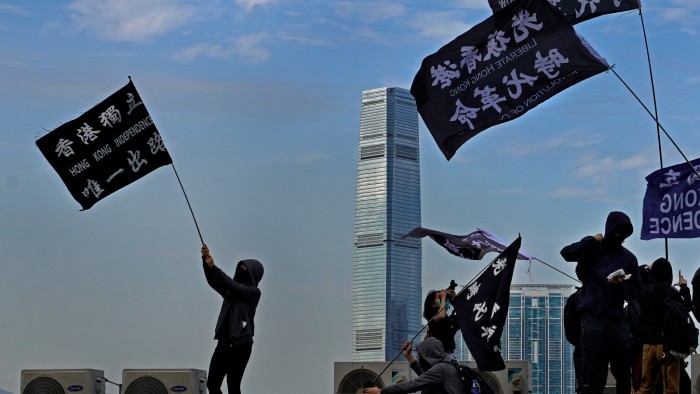Months of protests hit Hong Kong’s life insurance industry

Roula Khalaf, Editor of the FT, selects her favourite stories in this weekly newsletter.
Months of anti-government protests in Hong Kong have hit one of the city’s most lucrative industries and favoured channels for getting money out of mainland China — the sale of life insurance products to Chinese tourists.
The value of new life insurance policies taken out by mainland citizens in Hong Kong fell 18 per cent to $1.2bn in the three months to September, according to the latest available data from the territory’s Insurance Authority. Industry analysts warn sales have since fallen further as hostility in the territory towards mainland Chinese has grown and tourist arrivals have plummeted.
“Fourth-quarter momentum will be even worse than the third quarter because protests accelerated in September, October and November. It will be a big challenge,” said Shengbo Tang, an analyst at Nomura who covers Hong Kong’s insurance industry.
Hong Kong insurers have in recent years enjoyed a boom in business provided by mainland Chinese, who need to be physically present when a new premium is signed. Two of the biggest life insurers in the territory, AIA and Prudential, get up to 60 per cent of their new business in Hong Kong from mainland Chinese customers, according to analysts.
Chinese customers are the “key driver for the insurance business in Hong Kong”, said Frank Yuen, a senior analyst at Moody’s Investors Service. “Without the protests this year would be another strong year.”
The increasingly violent demonstrations, which began nearly nine months ago, have led to a plunge in retail sales and tourist arrivals. Visitors to Hong Kong from mainland China fell 60 per cent in November from a year ago.
“All the insurers I have spoken to have confirmed that they have been hard hit . . . particularly in the last quarter,” said a Hong Kong-based adviser to multinational insurance companies. “A lot of the life insurers have for a long time been reliant on the huge premiums from mainlanders. But they’re not coming to Hong Kong any more.”
To try to counter the slowdown, some life insurers have begun offering services in which prospective Chinese customers are bussed from the airport or land border with the mainland to parts of Hong Kong that have not yet been touched by the protests, people familiar with the industry said.
“One of my customers planned on coming to Hong Kong in November but when he saw the news of burning metro stations, he was very concerned about his safety,” said one insurance agent at AXA.
Mainland visitors have tended to buy in Hong Kong because “they want to get the money out of mainland China and into dollar assets”, said Mr Tang. The tightening of China’s capital controls in 2016 slowed that flow but did not stop it.
The protests have encouraged some insurers to ramp up plans to expand in the mainland, according to Mr Tang.
The opening up of financial markets has burnished China’s allure for insurers but gaining ground in the country is likely to be slow. “In the near term, growth will be slowing: mainland business won’t make up for the drop in Hong Kong,” said Mr Tang.
A Hong Kong-based spokesperson for Prudential said the company “remains extremely well-positioned to meet the growing needs of our customers, both domestic and from mainland China”. AIA declined to comment on the impact the unrest in Hong Kong had had on its business.
Comments